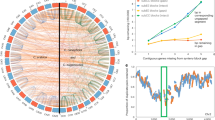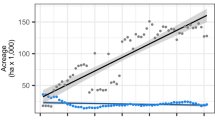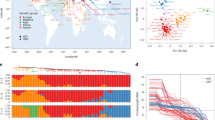Abstract
CULTIVATED lucerne, Medicago sativa L., is a tetraploid (2n = 32) and in all probability is an autotetraploid. Both it and its wild, blue-flowered, diploid relative M. coerulea Less. display incomplete self-sterility. Genetical situations being so much simpler in diploids, a study was begun at this Institute to see whether a single-locus, multi-allele, oppositional system of self incompatibility was at work in M. coerulea, similar to that found in Trifolium pratense1.
This is a preview of subscription content, access via your institution
Access options
Subscribe to this journal
Receive 51 print issues and online access
$199.00 per year
only $3.90 per issue
Buy this article
- Purchase on Springer Link
- Instant access to full article PDF
Prices may be subject to local taxes which are calculated during checkout
Similar content being viewed by others
References
Williams, R. D., and Silow, R. A., J. Genet., 27, 341 (1933).
Wright, S., Ann. Eugen., 15, 323 (1951).
Malécot, G., “Les Mathématiques de l'Hérédité” (Paris, Masson, 1948).
Cooper, D. C., and Brink, R. A., J. Agric. Res., 60, 453 (1940).
Author information
Authors and Affiliations
Rights and permissions
About this article
Cite this article
FYFE, J. Relational Incompatibility in Diploid and Tetraploid Lucerne. Nature 179, 591–592 (1957). https://doi.org/10.1038/179591a0
Issue Date:
DOI: https://doi.org/10.1038/179591a0
This article is cited by
-
Early-acting inbreeding depression and reproductive success in the highbush blueberry, Vaccinium corymbosum L.
Theoretical and Applied Genetics (1990)
-
Late-acting self-incompatibility in angiosperms
The Botanical Review (1986)
-
Breeding systems in Myosotis scorpioides L. (Boraginaceae)
Heredity (1979)
-
Balanced lethals and polymorphism in Rubus idæeus
Heredity (1967)
-
Inbreeding depression and heterosis in autotetraploids with application to Medicago sativa L.
Euphytica (1966)
Comments
By submitting a comment you agree to abide by our Terms and Community Guidelines. If you find something abusive or that does not comply with our terms or guidelines please flag it as inappropriate.



